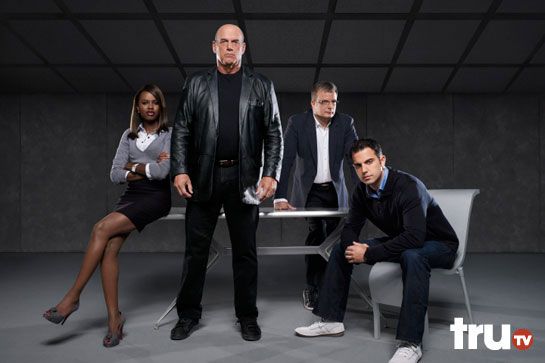Incredibly Bad TV Show: Conspiracy Theory with Jesse Ventura

Regular readers will know that we’re big fans of conspiracy theories here at TC. While not necessarily believing them all – especially the all-encompassing, shape-shifting lizards from another dimension type ones – they’re like intellectual table-salt. They enhance the flavor of life, and help foster a sense of cynicism about the motives and actions of government and those in power, which is certainly extremely sensible. However, just as conspiracy theories cover the gamut from plausible to completely-loopy [though remarkably entertaining], so does coverage of them in the mainstream media range from sober, serious consideration of the possibilities to… Well, to Conspiracy Theory with Jesse Ventura.
We should probably have got some kind of inkling from its location on Tru TV. The channel used to be known as Court TV, but changed its brand in 2008, now operating under the slogan, “Not reality. Actuality.” Going by shows such as Operation Repo, “actuality” appears to mean making stuff up and trying to give the impression it’s real. Saying Tru TV does not have a good record for serious investigative journalism is like saying Michael Jackson had some deficiencies as a child-care provider. But, hey, we’ll cut it some slack: after all, host Jesse Ventura remains one of the few people to crack the two-party system, during his spell as Governor of Minnesota. If there’s anyone capable of cutting through the BS, it’d be him.
Unfortunately, any hope of a balanced look at the topics under investigation evaporates in the fiery heat of the near-hysterical approach to the subject matter. After the jump, we’ll bravely go through the entire series, episode by episode, and expose the deadly truth about Conspiracy Theory!!!! Ok, perhaps not, but after you’ve watched a few of these shows, the style does tend to rub off…
Witness the first episode, looking at the HAARP project in Alaska. This is something we’ve been talking about for a long time, having previously covered the topic in 2003 – Ventura, however, was clearly not paying attention, cheerfully admitting he’d never heard of it two weeks previously. Ok, everyone has to start somewhere, and while the qualifications of the ‘crack team of researchers’ in Ventura’s ‘war-room’ are never produced (they include June Sarpong, a crony of Tony Blair and owner of an MBE – hardly an establishment outsider), they do talk to the right people, notably Dr. Nick Begich.
Begich is not just one of the most knowledgeable people on the topic, he’s also one of the most level-headed: he carefully avoids making outrageous claims, just lays out the facts and how he interprets them. This is in sharp contrast with the tone here, which labels HAARP as a weapon for causing tsunamis, controlling minds or even, as Ventura breathlessly intones, “a death ray.” This reaches its epic apex just before a commercial break, when Begich’s harmless demonstration of piezo-electic transduction to play music inside the Governator’s head is breathlessly previewed as: “Coming up: HAARP invades Jesse Ventura’s brain!” I can just imagine poor Dr. Nick watching this nonsense unfold and slumping, embarrassed, ever-lower on his sofa. We were right there with him.
The series keeps trying to provoke conflict where none is present, such as sending Ventura to the gateway of the HAARP facility in remote Alaska. After a spot of hanging around, a bemused security guard, having drawn the short straw, is sent down to discuss things with the former Governor, and advises him to come back during one of the scheduled open days. Yes, this top secret, brain-frying, death-dealing facility has open days. Truly, the Cold War is over. Guess they ensure the tsunami-creating device is carefully hidden in a cupboard or something on those occasions.

Jesse in his wrassling’ days
In the second episode, Ventura took on the Kennedy assassination of our generation: 9/11, with particularly unimpressive results. The main theory being floated for it was the ‘false flag’ one, that it was concocted to provide a pretext for invasion – but the obvious question was never answered. If that’s that case, why make all the terrorists Saudis, if we wanted to invade Iraq and/or Afghanistan? That’d be like the Nazis staging the Gleiwitz incident, and dressing the “Polish” corpses in kilts and sporrans. The episode instead bangs away at the missing black boxes from the two Manhattan planes, speaking to a couple of people who say they saw them being recovered. Interesting, to be sure, but hardly prima facie evidence for US government involvement.
The next installment took on global warming: initially, this actually seemed like the most plausible and, as a result, effective one. While scientific consensus tends to support the idea of man-made climate change, it’s by no means an absolute certainty – and, interestingly, those who are set to cash in on changes to counter this, include some of those who have been most prominent in pushing the idea, such as Al Gore. If they’d stopped there, the show would have been fine. Unfortunately, Ventura and his team then charged off in search of an over-arching plot, and the man in charge turned out to be determined to be billionaire Maurice Strong, a former top man in the UN (OMG! NWO! ZOG!) who now lives in… China (communist!). Needless to say, the team failed miserably to get any kind of interview with, or comment from, the man in question.
Roll on to part four, and the erosion of personal liberty and the growth of the surveillance culture is the topic. I’m beginning to detect a theme here: specifically, these are all reasonable, potentially important topics, covered in such a facile way as to make them ludicrous. There were any number of directions this could have gone, but after a couple of interesting anecdotes (such as the guy whose telephone call to his bank, led to a rapid visit from government representatives), the program derails into an investigation of Infragard. Wikipedia calls it, “a program run by the United States Federal government, which partners Federal intelligence and law enforcement agencies with private corporations, so that they can share intelligence information.” Really? That’s the biggest threat to personal freedom and liberty they could find? You gotta try harder, Jesse.
The hysteria certainly rose to previously unsurpassed levels as he investigated the Bilderberg Group and its members – who might be called “Bilderbergs” or “Bilderbergers,” there seemed to agreement at the point. Botox queen Sarpong pronounces gravely: “We’re proven they exist.” No shit, Einstein – what gave you the clue? Their Wikipedia page? As usual, the program charges off in the wrong direction, like a watchdog chasing after a passing car. There’s no mention, for example, that founder Prince Bernhard was a member of the honourary German Reiter SS Corps and also worked for IG Farben, the company which owned the patent on Zyklon B.
Instead, it wheels out the usual talking heads like Daniel Estulin and Alex Jones, who have both made good career out of fomenting the more extreme claims about the Bilderbergers and – woohoo! – even David Icke. He goes on about “they” a great deal, in the context of world rulers – yet the program carefully omits that to Icke, “they” means shape-shifting reptilians from another dimension [or did, last time I needed a laugh and checked his website]. They straight-facedly promote the idea that the Bilderberg Group are planning the wholesale depopulation of the globe, leaping from there to the Georgia Guidestones, with their proclamation that 500 million is the right number for humanity. It’s the “A-> B -> C -> Z” school of conspiracism. We were, however, disappointed that there was no attempt by Ventura to “storm” a Bilderberg group meeting. That would have been fun.
Episode Six was on Manchurian Candidates – mind-control, as carried out by the US military. Now, there’s no denying the reality of things like Project Mkultra, which operated in the 1950’s and 1960’s, before – at least, officially – vanishing. And Jesse’s “crack team of researchers” have no problem wheeling out 40-year old documents which refer to such experiments. The issue is not whether such experiments took place. It’s whether they are ongoing. And there, the evidence presented is a lot more flimsy – and, as usual, draped in the kind of paranoid nonsense which makes the entire concept laughable to neutrals, and tremendously irritating to those who feel there may be something to it.

She just looks that way.
However, I was particularly amused by the efforts the show depicted them having to make, to track down alleged mind-control operative Robert Duncan O’Finioan, liaising with Dave Corso in the back of a van parked in a Las Vegas lot, before eventually meeting O’Finioan in a deserted garage. I guess it was just too much trouble to go to his website, where a helpful block says, “To contact Duncan O’Finioan regarding speaking engagements please send an e-mail to info@duncanofinioan.com” He says he has multiple implants, stuck in as part of the mind-control process. Oh, good: physical proof, the crack team of researchers will be all over tha… No: a couple of blurry shots, and that was it. It may be significant, that when you type Duncan O’Finioan into Google, the first completion it suggests is “Duncan O’Finioan fraud.”
Finally – and it’s probably for the best, as the coffee-table probably needed a break from us banging our heads off it – we had the season finale, with 2012. Again, the show took nuggets of truth (yes, the government does have a lot of secret underground facilities; no, you and I won’t be welcome in them if disaster strikes), and wrapped them in insanity such as 2012 and the Denver Airport murals – as they have a tendency to do, the conspiracy theorists only ever show part of them. Taken as a whole, the work by Leo Tanguma is a good deal less sinister.
A particular highlight of this episode was June Sarpong driving all the way into the middle of nowhere to be turned away at a gate. Her conclusion regarding these facilities is, and I quote: “A lot of them have landing strips. That would help get materials in and out. It would also be a way to fly people in.” Wow, what a stunning revelation: I’d never have thought that landing strips might be used for…landing. Great investigative work there, June. Now, go get another injection of Botox, why don’t you?
Not everyone is quite as down on the show as us. A friend, who is deeply embedded in conspiratorial circles, but is definitely short of the lunatic fringe – we’ll call him “Agent B”, simply to create an entirely artificial air of Something Sinister Going On – sent us his thoughts on the show
You must be able to tell, as I can, that the man does, at least, have conviction when it comes to the subjects he pursues on the show. Further, his efforts far outweigh the lies, spin and utter distraction courtesy of mainstream media. As a fellow conspiracy researcher and concerned citizen, I’m all for a show like this. Yes, it sensationalizes just about every topic they investigate, but that is purely the fault of the network top brass. When someone wants to do a show on so-called “fringy” topics, there is always a compromise between those who really want free reign to investigate and what the show producers and the network actually want aired. I don’t like it any more than you do, but I say “exposure at all costs.” It’s amazing that the show is even aired and that taboo topics like 9-11, HAARP, Mind Control and the ever-so secretive Bilderbergers are even broached.
Heck, I was approached by a movie and TV production company about three years ago. It never happened, but the producers also wanted to create a weekly conspiracy show that would cover many of the same topics, but they wanted it to be even more edgier. The main producer was actually interested in having me as the lead, but he introduced ideas like having me air some late night podcast in a dimly lit scenario to ardent listeners, some of whom would call in and be guests (maybe similar researchers and topics like on Ventura’s show). I would also have to flit about from place to place in the cover of darkness for my own so-called safety in order to create a greater sense of paranoia and danger.
So, you can see that, even though they say they love a good conspiracy, the higher-ups are only interested in creating something that is entertaining for the most part, as well as profitable. If the public happens to be educated or even empowered by the intellectual material, that’s a mere side effect. I bring this up because Ventura’s show could have ended up being way cheesier. He may not be the most charming or well spoken ex-Marine, but, at least, he investigates… period.
There’s certainly a lot of merit in that approach, but I’m afraid I can’t be quite as charitable. There is a psychological process – I forget it’s name – but it controls how people react when presented with information outside their sphere. If someone is neutral on a topic, and is given data that’s somewhat positive or negative, it will tend to pull them in that direction. But if the data is extreme, at either end, it will tend to push the recipient away. For instance, show a neutral person evidence of conspiracies like Iran-Contra, and they’ll think more favourably of the field. But lock them in a room with David Icke for eight hours and they’ll never speak to you again.
That’s why the show feels to me like disinformation. Not that Ventura is in on it, I should stress, but it takes interesting or even important subjects (such as government surveillance) and portrays them is such an outrageous and extreme way, that it’s difficult to see how any neutral viewer could leave with anything except a snigger. The series reminds me of the time the late, lamented Weekly World News had a story on the CIA pushing drugs in LA. It was so far off their usual stomping-ground of aliens and Bigfoot, that the real purpose was painfully obvious: discredit the story, by placing it next to Batboy.
These are topics that do not need hysterical presentation – there’s enough meat on topics like 9/11, that a straightforward presentation of the facts would be more effective in creating a groundswell of interest. Of course, as “Agent B” points out, sensationalism = ratings, and it’s possible that is what’s behind TruTV’s over-the-top approach. At best, the show may have encouraged some viewers to do their own research. However, for anyone with access to a Google search box, there was basically nothing in the show to justify the tagline, “Think you know it all? Think again!“
TC: Article Zone » Blog Archive » The Incredibly Bad TV Show … | NewsTrend.org
[…] more from the original source: TC: Article Zone » Blog Archive » The Incredibly Bad TV Show … Share and […]